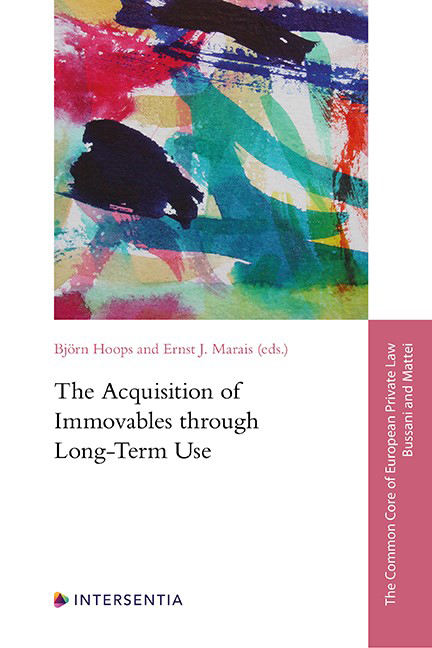Book contents
- Frontmatter
- General Editors’ Preface
- Preface
- Contents
- List of Cases
- Table of Legislation
- List of Abbreviations
- List of Contributors
- Case PART I INTRODUCTORY MATTERS
- PART II CASE STUDIES
- PART III GENERAL CONCLUSIONS
- Appendix I Instructions for the Project on the Acquisition of Immovables through Long-Term Use
- Index
Comparative Analysis – Case 3
Published online by Cambridge University Press: 26 May 2022
- Frontmatter
- General Editors’ Preface
- Preface
- Contents
- List of Cases
- Table of Legislation
- List of Abbreviations
- List of Contributors
- Case PART I INTRODUCTORY MATTERS
- PART II CASE STUDIES
- PART III GENERAL CONCLUSIONS
- Appendix I Instructions for the Project on the Acquisition of Immovables through Long-Term Use
- Index
Summary
GENERAL INTRODUCTORY AND COMPARATIVE REMARKS ON CASE
3 Case 3 addresses the issue of the extent to which public bodies are protected from losing their land to an intentionally unlawful user. The answers of the reporters demonstrate that the rights of public bodies, particularly in land with essential public functions, such as infrastructure, are generally well protected from acquisitions through long-term use. Gugu’s prospects of acquiring the land are thus generally low. The jurisdictions can be divided into several groups with a similar level of protection.
GUGU COULD ACQUIRE UNDER NO CIRCUMSTANCES
Alberta and South Africa offer the most extensive protection to all publicly owned lands. Statutes in Alberta preclude the acquisition of publicly owned land through long-term use. Land in South Africa with essential public functions is a res publica and, therefore, not subject to, in South African terms, prescription. In addition, the acquisition of other publicly owned lands by prescription is precluded by statute.
GENERAL STRICT REQUIREMENTS PREVENT ACQUISITION BY GUGU
The second group of jurisdictions do not rule out acquisitions of publicly owned land through long-term use, but apply the general, very strict requirements to the acquisition. These requirements apply to both publicly owned and private land. They entail that intentional or negligent occupation of publicly owned land will, with a few exceptions, not lead to an acquisition. This group includes England and Wales under the Land Registration Act of 2002, Finland, Germany, Norway, Russia, Scotland, Slovakia, and Sweden.
The exceptions to the rule vary across the jurisdictions. England and Wales allow for acquisitions of publicly owned land if the user applies for her registration as owner after ten years‘use and the owner does not contest the user’s claim within 65 days of receiving a notice of the user’s application. Also, the law of England and Wales permits an acquisition of publicly owned land that is adjacent to the user’s land if, in addition to the application for registration, the user acts in good faith and the boundary between the two properties has not been determined according to the designated procedure.
- Type
- Chapter
- Information
- The Acquisition of Immovables through Long-Term Use , pp. 643 - 646Publisher: IntersentiaPrint publication year: 2022



